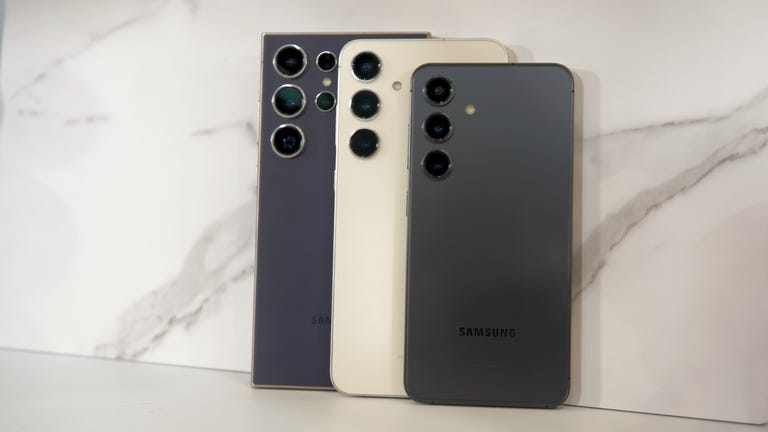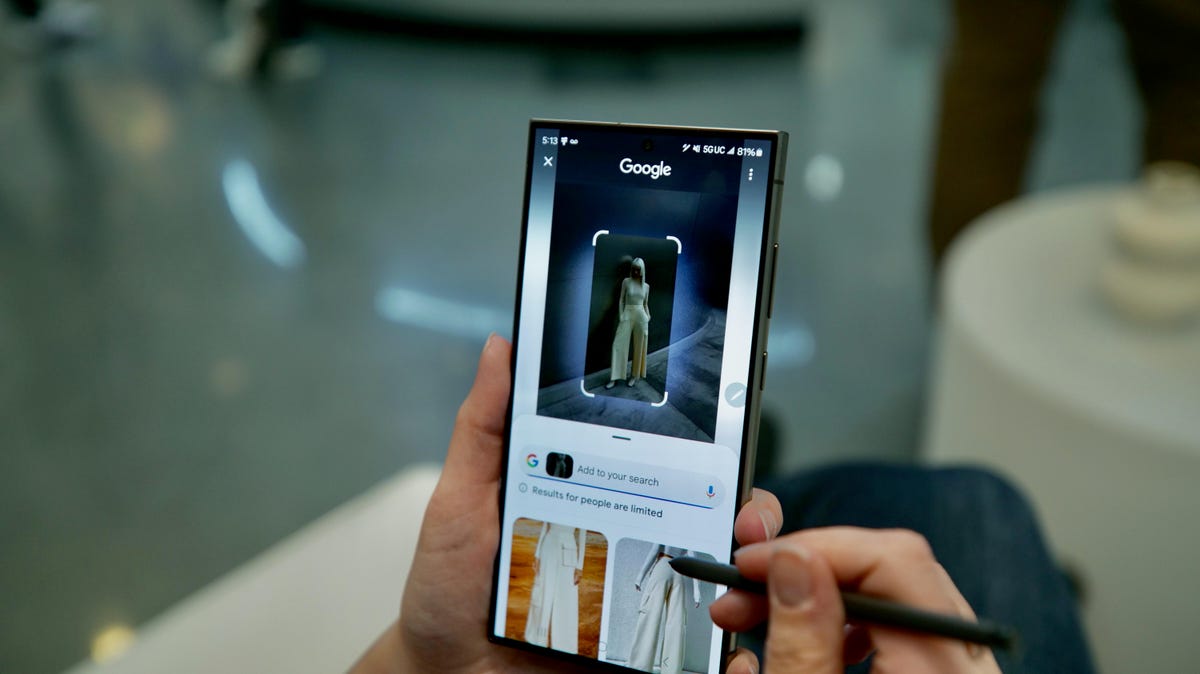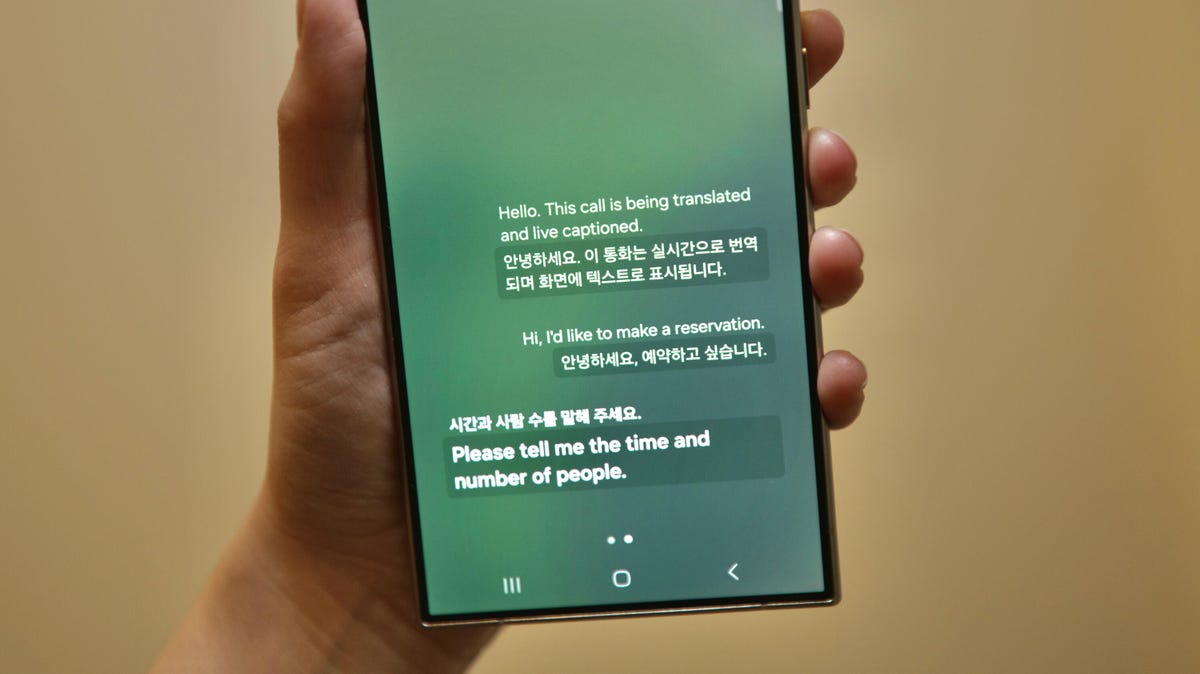With the Galaxy S24 series, Samsung is making its first big bet on generative AI, the type of AI that powers ChatGPT and has thrown the tech world in a fervor since the popular chatbot’s arrival in late 2022. Those efforts have culminated in a suite of new features called Galaxy AI that includes everything from photo editing options for moving objects in photos to translating calls between languages in real time. They arrive on the new Galaxy S24 family first before coming to the Galaxy S23 series.
In its current form, Galaxy AI consists of a handful of tools and features primarily aimed at communication, productivity and content creation. But that’s just the beginning, said Won-Joon Choi, executive vice president and head of the research and development office for Samsung’s mobile experience business, who sat down with CNET ahead of Samsung’s Unpacked event on Jan. 17. According to Choi, Galaxy AI will arrive on everything from foldable phones to wearables.
“Galaxy S24 is just a specific bar-type smartphone,” he said. “But we do have a lot of different form factors, so we’re going to expand our Galaxy AI into multiple form factors, like tablets, foldables [and] a lot of others.”
Read more: Best Galaxy S24 Preorder Deals
Galaxy AI feels similar to generative AI-powered features we’ve seen from companies like Microsoft and Google over the past year but tailored specifically for Samsung’s smartphones. The Galaxy S24 will be able to rewrite text messages in a different tone before you hit the send button, translate text messages and documents in Samsung’s Note app, translate live phone calls in real time, fill in parts of photos you’ve edited, and identify speakers in audio transcriptions, among other things.

Watch this: Samsung Reveals Its New S24 Series Phones and Their AI Chops
Some of these features might sound similar to tools Google previously introduced on the Pixel 8 family and in its own Messages app, and that’s intentional. Samsung and Google are partnering on certain Galaxy AI features, including Circle to Search, which lets you launch a Google search for any object in a photo simply by circling it.
Taken together, Samsung and Google’s efforts can be considered a sign that features like these are becoming the norm for new smartphones. And for Samsung, Galaxy AI provides a foundation to build on.
Choi couldn’t elaborate on forthcoming Galaxy AI features for its line of Galaxy Z Fold and Galaxy Z Flip foldables, Galaxy Tab tablets or Galaxy Watch wearables. But he did say that Galaxy AI features would be tailored to the device rather than a straight replica of the Galaxy S24’s offerings.

The new Circle to Search feature being shown on the Galaxy S24 Ultra
“Rather than just simply extending it, we want to come up with very specific…optimized experiences according to those form factors,” he said. “Not just [a] copy and paste but enhancing the experience for those specific form factors.”
Samsung is no stranger to AI — it established the Samsung Research Artificial Intelligence Center in 2017 and launched its Bixby voice-enabled virtual assistant that same year. But Choi doesn’t see Galaxy AI becoming a replacement for Bixby in the future.
Read more: From AI to Mixed Reality, CES 2024 Products Imagine a World Beyond Apps
Instead, he sees Samsung’s new generative AI developments as a means to upgrade Bixby, which may be crucial considering the Google Assistant, Apple’s Siri and Amazon’s Alexa are the most-used voice assistants in the US, according to Insider Intelligence. Samsung is currently working on a new version of Bixby infused with generative AI, although Choice couldn’t comment on timing.
“Bixby will evolve with the help of generative AI and basically will get smarter and understand people better,” he said.
AI has played a big role in our phones for years when it comes to tasks like separating the background from the foreground in portrait mode photos and language translation. But Galaxy AI is just one example of how tech giants are trying to push that a step further by putting more sophisticated tools in the hands of users rather than using AI in the background.

Live Translate on the Galaxy S24 series can translate calls in 13 languages during a conversation.
“It’s not behind the scenes,” Aaron West, senior analyst for market research firm Omdia, said to CNET in a previous interview referring to generative AI. “It’s really obvious that your phone is actually doing something and generating something new and original.”
It’s going to take time before we know how generative AI will change the smartphone experience on a more fundamental level. Sameer Samat, Google’s general manager and vice president of Android, Google Play and Wear OS, similarly believes we’re the beginning phase. When speaking with CNET at CES 2024 ahead of Samsung Unpacked, he said it’ll take time before AI influences the smartphone software and operating systems more broadly.
“We’re still early days and all of that,” Samat said. “But I think we’re seeing how that can come together in ways that can really help you accomplish a lot more.”
Editors’ note: CNET is using an AI engine to help create some stories. For more, see this post.

